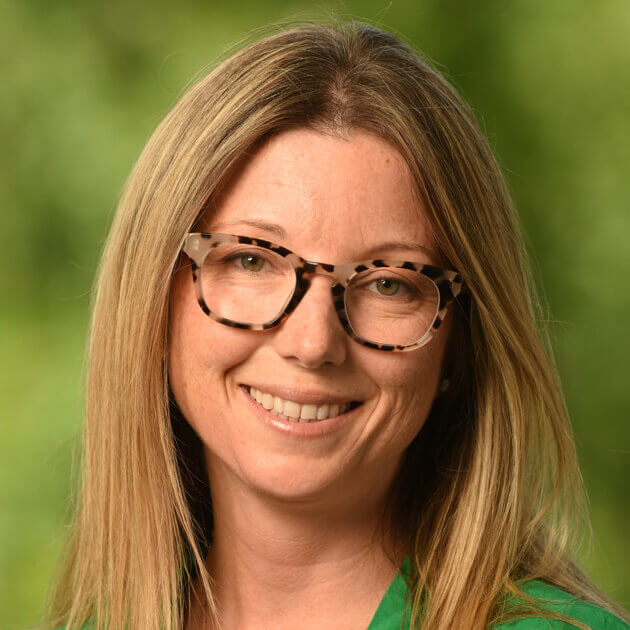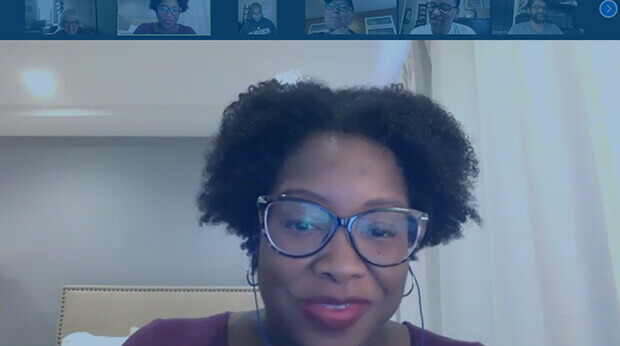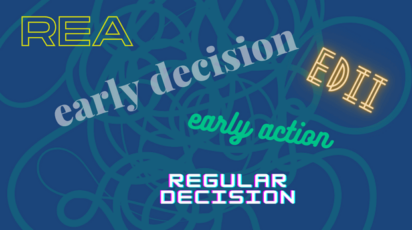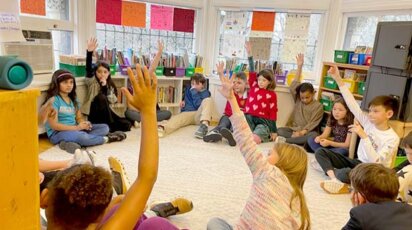News
Responding in the Moment: Professional Development Training
Anti-racism training is a key aspect of Poly Prep’s commitment to fostering an inclusive environment for all students. On October 13, Poly’s faculty and staff welcomed Erica Corbin, a leader in building welcoming and equitable environments in school, as part of our school’s ongoing professional development. In a presentation, entitled “Responding in the Moment: Reestablishing Dignity and Value in the Classroom and Beyond,” Corbin facilitated discussions designed to offer guidance, tools, and protocols for this important work, explaining that “for white people to effectively engage in anti-racist practice, [it] requires time, education, reflection, and accountability to people of color.”

“Erica’s time with us was superb and has helped me to reflect and think of concrete actions to take in my personal, professional, and community relationships as it pertains to anti-racism. She offered the beginning of a roadmap for teachers working within classrooms and for the school and its systems.”
Jean Belford P’24

Corbin reviewed a history of race in independent/private schools, following the Brown v. Board of Education and Green v. County School Board of New Kent County Supreme Court decisions. She also described programs like Prep for Prep, which have evolved over the years to help students of color navigate predominantly white educational institutions. Corbin also provided definitions of terms such as “anti-Blackness,” stating that it “is a two-part practice of racism that both voids Blackness of value, while systematically marginalizing Black people and issues.”
“Erica Corbin was engaging, thought-provoking, and wonderfully forthright about this work and what it entails. Her clear definitions of ‘anti-racism,’ ‘anti-Blackness,’ and ‘white privilege’ were incredibly useful to us as we work to develop common language, an important precondition of all collective responses to systemic racism.”
Assistant Head of School, Academics Michal Hershkovitz, P’16, ’18


Corbin also offered tangible communication and breathing techniques to help address racist microaggressions at the time they occur, emphasizing that students will remember how teachers react—or don’t react. “Erica Corbin’s presentation reminded me how important it is to be honest, with ourselves and others, about where we fit into structures of injustice,” said Upper School Dean, Chair Emily Gardiner P’24, ’27. “And with that honesty, comes the mandate to be vocal and assertive about undoing that injustice in our community.”
Giving oneself a moment to breathe or pause will help center one’s response, Corbin explained, advising faculty and staff to take time to understand what someone has said and to follow up with a “How do you know?” response that will provide opportunity for dialogue. Self-reflection and being honest with oneself was a connecting theme in her presentation. These insights prompted Gardiner to reflect on “all the ways that self-examination and everyday human interactions, as well as overarching policy and curricular decisions, are essential to the goal of becoming an anti-racist institution.”
According to Corbin, the power of the apology is another lesson for predominantly white institutions to embrace. The act of apologizing can have a lasting impact and demonstrates accountability. This process, Corbin described, calls for centering oneself, listening, offering an authentic apology or acknowledgment for one’s actions, and finally being able to move forward from a transgression and not rehashing it in the future. She summed this up with the acronym CLAIM: Center – Listen – Apologize/Acknowledge – Inquire – Move On.
Over the course of the discussion, Corbin emphasized that one’s behavior is greater than one’s belief and advised against giving oneself a title of “ally” and that it is more appropriate to be an advocate or accomplice in the fight against inequity. “She left us with some key takeaways,” said Hershkovitz, “that behavior is more important in this context than belief; that whites are well-advised to identify themselves as ‘advocates’ or ‘accomplices’ rather than (the more passive) ‘allies’ in anti-racist work; and that while ‘calling out’ is about counter-productive shaming, ‘calling in’ is an effort to engage in much needed conversation and repair.” Everyone is capable of slipping up, Corbin reminded everyone, but urged Poly faculty and staff to also to keep in mind that it is important to listen and not defend or explain away a transgression. Talking about race more will make it less awkward in the long term, and help us begin the essential work of dismantling racism.
“This holistic approach which includes both wide and narrow lenses is critical,” said Computer Science teacher Jean Belford. “I hope she returns to Poly at some point in the very near future.”
“It was so heartening to hear faculty respond enthusiastically and appreciatively to Corbin’s session,” said Hershkovitz. “Her knowledge of the challenges ahead and how we can meet them clearly resonated.”
Erica Corbin is currently Director of Community Life and Diversity at the Chapin School, a K-12 independent girls’ school in New York City, and previously worked at Collegiate School, a K-12 independent boys’ school.



